The Secret to Dropshipping Profit? Consistency.
The Facebook Pixel, outsourcing, white-labeling...
Our guest on Start Yours today has had made quite a few discoveries in his road to dropshipping succcess. At 21 years old, these discoveries have not only helped Daecian learn, fail, pick himself up, but also allowed him to scale and grow his business.
His biggest takeaway of it all? Consistency, which he says is the key to achieving goals.
From learning about ecommerce marketing and selling to emotions to the importance of branding and outsourcing, Daecian very generously spills all in this episode. And that includes numbers.
If you're keen to learn more about a young dropshipper's success story, the numbers (profit, not just revenue) he was pulling in, and how he got there, tune in.
Short on time? Here's a seven-point TL;DR version:
- Daecian discovered and learned about dropshipping on YouTube.
- If you want to increase your net worth, network.
- Not knowing what it was, Daecian shunned the Facebook Pixel when he started. Today, he's an advocate.
- Being consistent with everything, not just with dropshipping, will get you to your goal.
- Branding is crucial. If your store looks like a dropshipping store, you're never going to be successful.
- If you're making ten to 15 sales a day consistently, you can consider shifting to white labeling.
- You can easily outsource and hire a virtual assistant for $3 or $5 an hour so you can focus on the operational side of the business.
Start Yours is a podcast about ecommerce, dropshipping, and all things launching a business.
Join us as we meet entrepreneurs who have gone through the triumphs and headaches of running an online store, and learn how they managed to survive and thrive.

Don’t wait for someone else to do it. Hire yourself and start calling the shots.
Get Started FreeJourneying Into Dropshipping and Going Rogue
Aleisha: Daecian, thank you so much for joining us on Start Yours. I would love to learn a little bit about who you are and how you got into the world of dropshipping.
Daecian: So the first time that I ever heard about dropshipping was really when I started to understand that, okay, I don't wanna work at a nine-to-five, I don't wanna be slaving, I don't wanna have a normal job. I never wanted to have that. I always knew that I wanted to make money and work for myself, and there's nothing wrong with that.
And around when I just turned 19, I started to realize like, "Hey, I have no money." And I think it was because I was coming from the lack of money, I only wanted it more. So then I literally started to research some things online about how to make money online because, I don't know, that's just what I wanted to do, I wanted to have that freedom lifestyle.
And then, about a couple of months after that, dropshipping really just landed in my lap. I started to see it a lot more. This is around late 2018, so two years ago, and it wasn't a huge thing then.
But yeah, so I just literally wanted to make more money. I started to research a lot, and then I was looking at all these young kids on YouTube making $600 in a day, $10,000 in a month, and I was like, "How are they making this amount of money? It must be a scam." And I think that's such like a mainstream way of thinking, when you're on the outside you love to judge something that you've never heard of before. So I was like, "Oh, they're young, they're just scamming people."
I didn't know. And then it was just really an uneducated opinion to make. And I started to research it a lot more and I realized like, "Hey, this is just ecommerce." But it's a business model where you're minimizing so much risk. So you don't have inventory, you're not having these huge upfront outgoing costs, like I said, your inventory, your logistics, your warehousing, you don't have to pay someone to store it. You have none of these upfront startup costs.
Your only startup cost is marketing, which is your Facebook ads, and the host of the platform, which I always... It was a no-brainer for me to be like, "Okay, I don't have this capital, I wanna get into dropshipping, this is such a great business model, and I feel like I wanna do this."
And when I started, I really went into it with the mindset, and this is something that I think we really wanna talk about, is the mindset of, "I don't care how long it's gonna take. I'm gonna be so consistent with it." Because I get a lot of people that are trying to get into ecommerce and dropshipping and things like that, and it's like, they're like, "Oh, can I do this as a side hustle?" Or, "I'll try this a few times and if it doesn't work, then I'll just give up."
And if that's the mindset that you're going into this with, and literally anything else, you're never gonna succeed in it.
And that's my personal opinion, that's what I've taken from this. And because I was always going into dropshipping with, “I don't care how long it takes,” whether it's one month, one year, ten years, I didn't care. I just knew that if I constantly put in the work, I would make it happen because I've seen all the evidence from these people, these young entrepreneurs that are... Not even entrepreneurs, like these young kids that are just making hundreds of thousands of dollars a month, and I'm literally watching it on YouTube.
So yeah, that was kind of the catalyst behind it. I just wanted to make more money and I never had money, so... Yeah, that's where it all started for me.
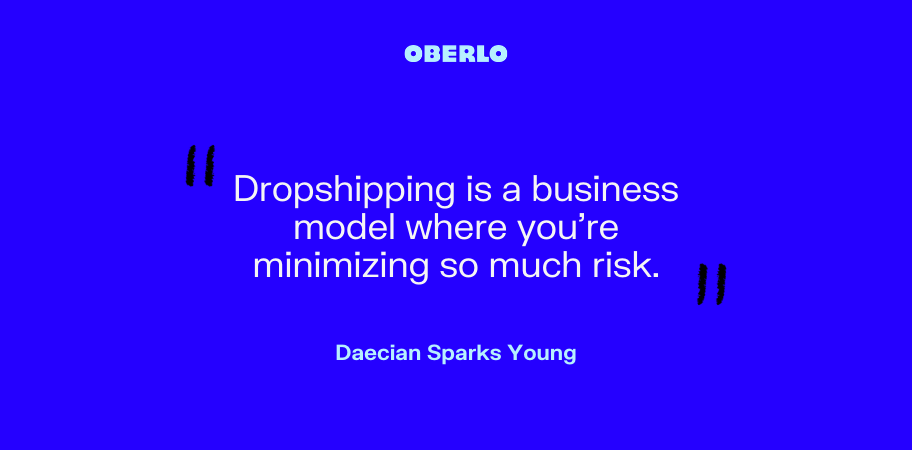
Aleisha: Do you have friends that are into business or that are entrepreneurial, or were you like this sort of lone wolf that figured this out?
Daecian: Yeah, that's a great question. I had no friends that were in business, I had none, all my friends were just either going to uni, going to... I don't know, still studying, or just working a nine-to-five.
And it was really a hard decision for me to make to get into business because I had to leave all my best friends, like I went... A lot of people don't understand the hustle that you have to do to become successful. Not even successful, I wouldn't call myself successful, but to make your goals a reality. And so I literally, I had no friends that were doing it, and I knew that if I want to succeed, I have to really abandon that.
And it was a really hard decision to make because I was getting judged a lot. It was like, "Hey, you're a high school dropout, you don't know what you're doing. How are you gonna start a business if you're not going to uni?" And it's like, at the same time, “Why would I go into debt to start a business?” It just made zero sense to me.
But yeah, so I had to go missing, I pretty much went MIA for eight to nine months. I deleted all social media, I would only follow low-retraction pages and people that were actually killing it in that industry.
I'm a massive believer in manifestation, and if that's all I'm constantly looking at and constantly absorbing, it's all I'm gonna get back in return.
So yeah, I had no friends that were doing it, and now I have a lot obviously because I network a ton. Networking is key, especially if you wanna increase your net worth. Your network is your net worth. So I really went, I didn't leave my room, I was a massive hermit, and I was just studying literally around nine to 15 hours a day just watching YouTube videos because I wanted to succeed more than I wanted to breathe, in a way.
It's like, when you're in that mindset, that's when you really make it happen. And yeah, so I have a lot of friends now that do that, ecommerce, but not at the start, I had no one.

Aleisha: Yeah, I think I agree with you. It's about who you surround yourself with. I'm really interested in, as you said, attracting people that will help your drive, will give you that sort of push to do it. But also, I'm fascinated as to how you took that time off social media, which I think is really good 'cause that can be so distracting, especially if you are just...
Daecian: Yeah, definitely.
Aleisha: I find myself doing the scroll and going, "Is this worth the time in my life to do this right now?"
Daecian: Oh it's a drug, it's so addicting.
Breaking It To the Parents
Aleisha: It is, and it does something to you, it gives you that hit, doesn't it? But what do your parents think about where you've sort of taken this now? And we'll get into where you've taken it, obviously, I'd like to know more about your back story, but I'm just fascinated by what the parentals think.
Daecian: Like now, not before?
Aleisha: Yeah. Or both, actually, when you went... Did you go to them and say, "Hey, I've got this thing that I'm really interested in getting involved in," or did you just do it?
Daecian: Because I was working in labor, I was a laborer at the time, because I was just like, I'm getting up at 4:00 in the morning, I'm driving two hours to work, working 10 hours to 12 hours physical labor, and then driving two hours home. It was horrible, and at the time, I basically stopped doing that because I was like, “I wanna pursue this,” and they were very, very supportive and I credit a lot of everything that I've done to them.
But at the same time, because I wasn't working for those like eight months, I was just literally studying. In a way, it was YouTube University; that's my philosophy on life. You can learn anything on YouTube.
Aleisha: I agree.
Daecian: Yeah but you cannot become a rocket scientist on YouTube, that's a bit... Or like a brain surgeon.
Aleisha: Sure, we're not promoting anyone doing any sort of medical procedures, forget that. But we're saying you can certainly learn business and marketing and entrepreneurial sort of skills. Yes, let's put a caveat on that.
Daecian: But yeah, so when it started to become... Like I started a few stores, and I did around four or five or six and none of them worked, and then they started to kind of be like, "Okay, what are you doing? Are you gonna get a real job?" All that.
So they were definitely supportive at the start, but once you're not making money for a period of time and you're living at home and you're, I guess, not paying rent, you're not helping out, you're just in your room every single day, your parents are gonna start asking questions about like, "Come on, what are you doing? Are you actually studying?"
But now, they're super, still super supportive. They understand how hard I've worked for this. But yeah, they're very proud. They're very, very proud of me.
My parents are separated, so my dad’s like, didn't really understand anything. So he had no idea what I was doing, and then all of a sudden I'm making these stores that are doing over six figures a month. Then he's just like, "What? What are you doing?" And he's very confused, he's kind of updated with it now but still, he kinda doesn't understand it. But my mum has... Yeah, she's really proud of me.
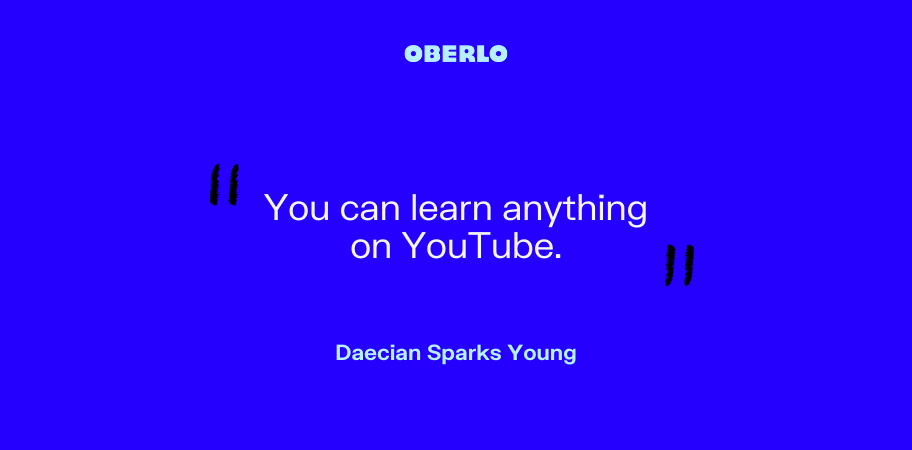
Aleisha: That's great. Well, congratulations, it's really, it's good to hear and I think it's... Especially not coming from having parents that are in the sort of business or into the business framework and then doing it yourself is really impressive.
Daecian: Yeah, definitely.
Shunning the Pixel and Finding Success
Aleisha: Tell me a little bit more about when you first started out and some of the highs and lows of starting those stores, 'cause you've had multiple stores, and I know you've had some really big wins. But like a lot of our listeners and merchants that are getting into ecommerce and dropshipping as well, it's not all sunshine and roses to start off with.
Daecian: No way. Like, 99 percent of people, if they went through what I went through, I feel like they would have given up for sure. And just when you're about to give up is always when it worked.
And so I had several stores, I was literally selling anything on AliExpress that I could see. I was selling iPhone cases, watches.
And it's so funny because I look back at it now, and I was talking to one of my friends last night about it, I was so scared about learning Facebook ads and I had no idea how to do it. I remember I was watching like people on YouTube and they would talk about the Pixel, and I'm like, "The Pixel? I'm never ever learning Facebook ads. What is a Pixel?" They're talking about algorithms, AI, and everything like that.
And I never started a store on Facebook because I was too scared to learn about the Pixel.
So what I used to do was I would do main-page shoutouts, I was going into main pages and I was paying them like $100 or $50 or $20 even, really small. And they would have maybe 100,000 followers and I would market this as an impulse buy on that main page 'cause it had such a big reach.
So, yeah, the very first product that I ever made a sale with was an iPhone case, and it was just some iPhone case I got on AliExpress for like a dollar, and I sold it for $20 and someone in India bought it and I'm like, "What? India?"
Aleisha: What?
Daecian: And like it was so crazy but... And then I tried jewelry, I did a little bit of jewelry, to do with some other main pages. So, yeah, just like... That's how I was starting out, I was going to... But I wasn't making anything, like this was... I was losing money still, and that's why I'm saying the majority of people would have stopped because they're losing money.
But I wasn't going in with the mentality of, "I'm gonna try this a few times and if it doesn't work, I'm gonna give up." I was always like, "I'm learning so much, I'm paying $100 to learn something that's gonna make me hundreds of thousands of dollars, if not millions," and that was always the mindset that I had going into it. It was just like consistency, consistency.
And I had about, I literally probably tried over ten products, I had no idea what I was doing. I had no guidance, and there wasn't as much education right now... I mean, there wasn't as much learning material back then as there is now. You can go onto YouTube and easily learn how to start a dropshipping business. But back then, there was nothing. Like two years ago, there was literally nothing, no one was talking about it really.
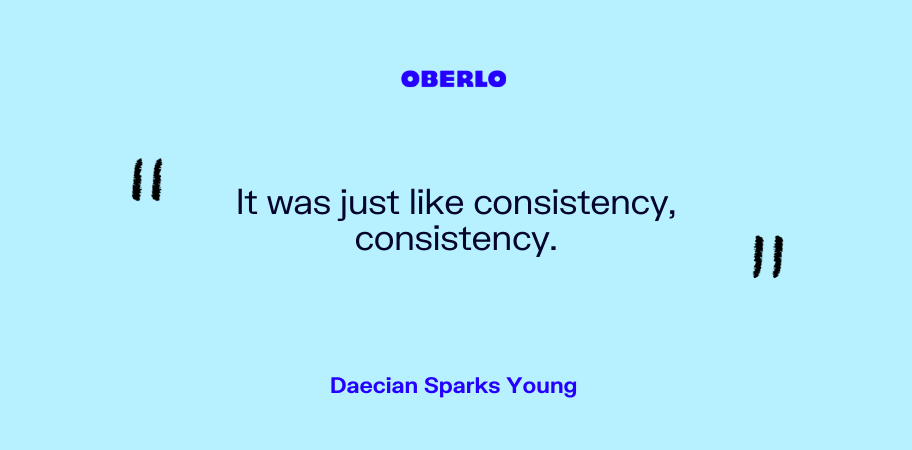
Aleisha: To do a little plug here, Oberlo has the Dropshipping 101 course, which is absolutely free. All you have to do is sign-up with email and it comes to you straightaway.
But I agree with you, there are just so many really easy step-by-step guides that you can learn, and for those people listening who have no idea what a Facebook Pixel is, let's just enlighten them and tell them that it's...
Daecian: I still don't know if I know what a Facebook Pixel does.
Aleisha: Well, everyone, do you wanna tell them or me? I mean...
Breaking Down the Pixel
Daecian: So basically, a Facebook Pixel is something that gathers data from all your customers or just traffic that's going to your website and it tracks their actions on your website.
It's basically just a tracking device.
So, for example, it learns by the amount of traffic that you send to it. So if you have a Pixel on your website and you send traffic to it, it basically knows everyone who is coming onto your store. There's this thing called data-driven targeting, where you can use the data that you have from all those existing customers and then run lookalike audiences, which, based off those customers, you can launch lookalike audiences.
So let's say you have 300 customers on your website, you can then go and use that existing data and launch lookalike audiences now with the Pixel, and you will have an audience size of over a million based on the same characteristics that the customers have on your store.
Aleisha: And it also... It's great for dynamic ads as well as... And if you... An easy way to describe that is if you click on a pair of shoes in a shoe shop, then you might be going all over various websites, and you keep seeing that ad come up, and that's because the website has... Yeah, you've been pixelized!
Daecian: Exactly. There's... Do so many different things with a Pixel. You can re-target, like you were saying, you can re-target everyone, you can build data-driven targeting off it, and you can also go in and... It also tracks everything that's happening on your website. So yeah, it's basically just AI and it absorbs everything that's happening on your store.
Aleisha: It's great, and it's so handy, and I always say if you've just... Even if you're mucking around on a store, it's just really good to be able to put that Pixel in there straightaway, so you're recording anything.
Daecian: 100 percent. I advise anyone that's watching right now, if you don't have a Pixel in your store, you 100 percent need one, and it's super easy to install, super easy.
Aleisha: Yeah, that's what makes Facebook very powerful. Let's talk a little bit about consistency. You're really passionate about this consistency, and I think that's a great topic to really hit on hard with this episode.
Tell me what that means to you with consistency, especially in running your business, and where that's taken you over these last few years.
Consistency and Selling Emotions
Daecian: Yeah, so consistency is something that I preach to everyone. And if you're not consistent with selling, there's no point in doing it. It's, in a way, it was like when I was having all these learning experiences of stores not working, it's consistency that's gonna get you to where you wanna be. And it's just like anything, like any sport, dropshipping is the exact same.
So, the more you're being consistent with it, the more you're gonna learn, the more you're gonna practice, the better you become. Just like anything, same with football, same with tennis, with anything.
It's just consistency is what's gonna get you to your goal.
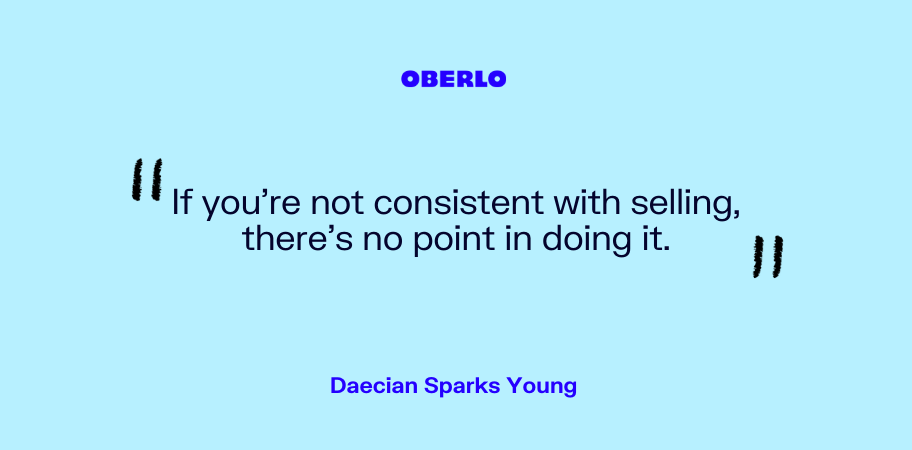
Aleisha: Looking at business then and the businesses that you have run, and I really wanna touch on the niche that you got into that really made you successful, I suppose. And I say "successful" as in financially successful in hitting your goals.
What was it that made that turn around for you, was it the product, the niche, or was it the way you were going about running the business?
Daecian: Yeah, I feel like it was the product. So the product was a really good product, and it was also, I had started to use Facebook ads; I wasn't scared of the Pixel anymore. So, I started to understand how to run Facebook ads and it just made so much more sense for me.
And I knew that if I launched this product with Facebook ads, because I had never run... I had run them before, but not with a strategy going into it, I would always run them without a strategy, and you need a strategy running Facebook ads.
And yeah, so it was a mixture of the product and the Facebook ads. And the timing as well, it was the perfect timing, it was a seasonal product. So I launched it in Australia in the winter, and it's a winter product.
And I'm massive on selling emotions.
The niche that I got into was the relationship niche. Like I said, I'm huge on selling emotions, so I knew if I sell something in the relationship niche, and let's say I'm marketing it with my ad copy as like, "Oh my god, my boyfriend just bought me this jewelry with our anniversary date on it," then every guy that's gonna see that is gonna subconsciously think, "Okay, my girlfriend's gonna feel amazing if I buy this for her."
So then they buy out of the emotion of love, and love is a huge emotion to target, so that's why I got into the relationship niche. But yeah, so that's how it all began for me was just having the right product in the right niche and putting it in front of the right audience.
Aleisha: It's interesting that you talk about emotional purchases 'cause I think that is underestimated, especially in the... Well, not ecommerce, but say, the dropshipping community probably, there are a lot of impulse buy products that are really good to market on Instagram, for example, that you scroll past and see it and go, "Great! It's 30 bucks, I'm gonna buy it."
What's the difference... I get that you're hitting those special moments, again, especially when you're going into buying gifts for someone that you love or are trying to impress.
What was it that made you send the little bells off in your mind, going, "Oh I have found the thing that people are going to feel something for," rather than just hit that buy button?
Daecian: I kind of knew because there was a similar product going around and I knew that it would pop in this niche, so I kind of knew that I wanted to sell long-term, and if it was impulsive it... I knew that it would just be a trend and it would blow off and blow over, but I knew that I wanted to sell long-term and the relationship niche, I feel like it was something that I could build off of.
There are definitely things that I did completely wrong, and going back with it now, I could have made so much more money than what I did with that one product. I always preach going with your gut feeling and yeah.
I just knew that the relationship niche would be more long-term rather than just, I don't know, in a couple of months, it's dead.
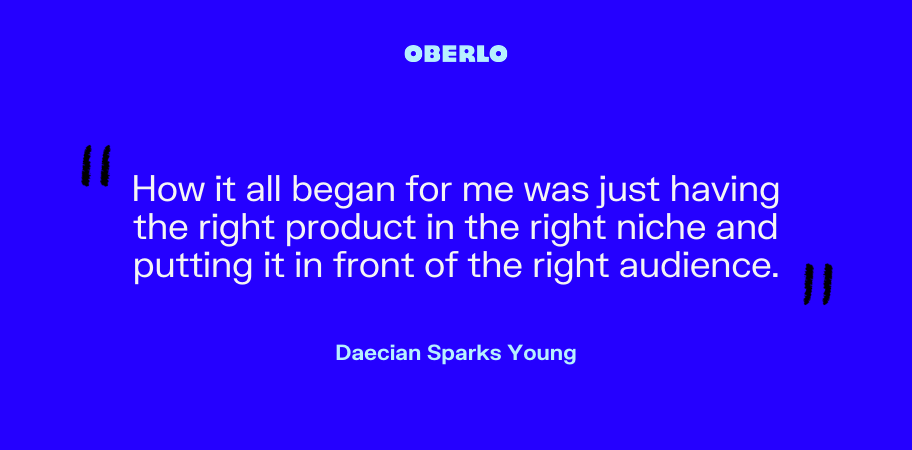
Aleisha: So we don't wanna reveal what the actual product is, but can we say it's a wearable product?
Daecian: Without giving... I don't want to give too much away, but a product that you can wear with your significant other. So in a way kind of like a main-y kind of thing, and it was like, if you had a partner, you can definitely be using it together and wearing it together, I guess you could say.
Aleisha: I know what the product is and obviously we're not gonna reveal it, but it's very cute and very shareable, and I think something that is for the demographic you are marketing to really shareable on social media, I think it's a really clever idea and something that you would see people putting on Instagram and Facebook straightaway and...
Daecian: 100 percent and that was the thing, I could see it going as a trend, and I could see it moving towards, kind of, like a laughable thing. It was like fun, and if I could sell fun with love, that's gonna last so long. So yeah, that's definitely why.
Dedicating Effort To Branding
Aleisha: Now you do a lot of work with other dropshippers, and I think you're really heavily involved in the community. What interests me about learning about this sort of this world, I've sort of been in ecommerce, but I haven't necessarily been as involved in dropshipping, and there's a lot of stuff out there about how quickly you can turn a store around, how fast you can choose a niche and get out there and make money, which is great.
But also, what I'm hearing from you is about research and really thinking about the emotive part of why people make purchases and then also how you market it, tell me a little bit more about how you came to the conclusion about tugging at the heartstrings, writing your copy, and the imagery that you used on your brand site because I'm guessing you put a lot of work into that rather than just using stock stuff that came from AliExpress.
Daecian: You're not gonna launch a store if you're an absolute beginner and immediately start making money. That's just an absolute myth. Like, for example, now, I launched a store last night and I woke up to sales, like a brand new store, just because I've been doing it for so long. It's like anything and that's why consistency is so important.
But at the same time, it's like you gotta put in the work, and when I started, the reason why I feel like mine worked is that I ended up just turning it into a brand. I really put time into my websites, I really put time into my social media.
So if you're looking like an existing brand, that's when you... I feel like it would be more successful than if you're just looking like an average dropshipping store, it's not gonna work. That's what I tell everyone.
If you look like you're dropshipping, you're never gonna be successful.
And that's why I was putting so much time and energy into creating my store and creating a social media that looks like it's been in business for years. So that's something that's definitely important to do. But at the same time, it's like you don't have to be perfect. Just launch it, get it out there, and work on it. You'll be able to read your data and see where it's not working and make adjustments in that area to make it work.
It's just like a kinked hose. So let's say you have a hose and it’s kinked, you're trying to un-kink it in that area based on what your data is telling you. Yeah, so I was putting a lot of time into that, for sure. And then I ended up getting custom packaging to make it even look more branded, and people ended up sharing it on their stories, so I ended up doing like white-label dropshipping, if this is what you want to get into now...
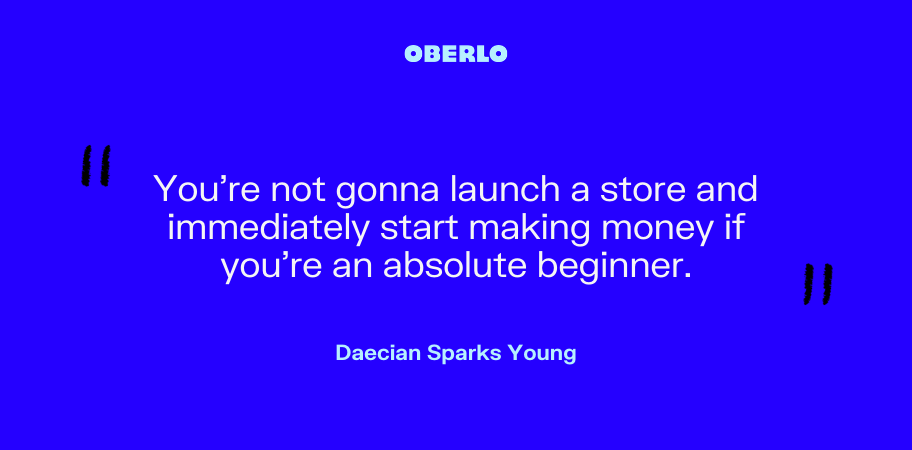
Aleisha: Yeah, let's do it, I think white labeling is really interesting. Tell us what that means and how you went from having this niche product that was working for you to then making the leap and the decision to actually start to up the game, I suppose, and to white label.
Shifting To White-Labeling
Daecian: Yeah, so I started doing very consistent orders and I knew that if I wanted to build this to the best of my ability, then I needed to really try and brand this product, and I had no experience with branding, it was my first business that I ever earned that actually was profitable.
So it just made pure sense to me to... I had private suppliers at the time, and they were able to actually white-label the product, which is essentially where you have an existing product and you put your company's logo over the top of it.
So that's what I started to do and you can actually dropship while you do this, and a lot of people don't talk about it. Essentially you're just dropshipping the product, but it has your logo and it has your custom product packaging, and this is what I wanted to really get into when I was making very consistent orders.
So I was doing like 100k a month, and I was reinvesting that money into getting custom packaging. So on the package, it would have my... It was like an amazing customer experience. That's like the main thing.
If you're trying to create a long-term and sustainable brand, you need to be taking care of your customers no matter what.
Whether that's doing refunds, if they don't like the product, just give them a refund because you can make an extra sale from someone talking.
So I started to get into custom packaging and it had my logo on the brand, so I was getting a lot of people on social media like just tagging it, thinking that I'm an existing business, probably thinking that it's run by some 50-year-old that's been in business for years, but I've been in business for four months and it's doing crazy numbers.
So yeah, I really, really love the white-labeling method, kind of... The business model of white-label dropshipping.
Aleisha: So when you... Okay, so when... Just to... Let's go just a little bit further into white-labeling 'cause people are really interested in this.
When you had the relationship going with your suppliers, how much product did you have to move before you could even sort of consider this as an option?
Daecian: Yeah, so I have those suppliers still, I can still use them to this day. Like if you're making a consistent, let's say ten to 15 sales a day, you can 100 percent white-label dropship. Then that's enough for you to actually start going out there and consider white-label dropshipping, in my opinion.
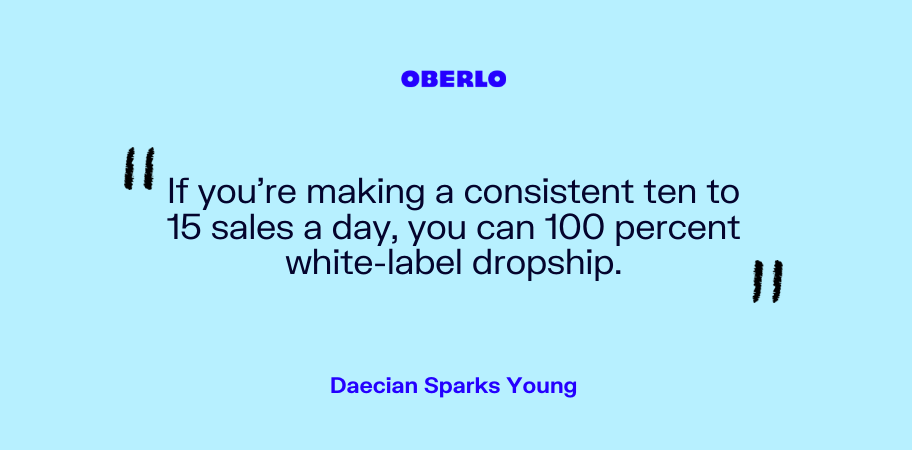
Aleisha: And what do you do to approach the supplier? You just pitch it?
Daecian: You definitely need... Yeah, I guess you need to have the connection as well. So like if there is anyone listening, just message me and I'll connect you directly to my supplier. But I actually have a friend in the US that owns his own kind of outsourcing agency, and I just go through them and so they do all the hard work.
I'm huge on outsourcing, and if I can outsource to someone else and still get faster shipping times, better quality, custom packaging, and also a cheaper product, then that's a no-brainer.
Aleisha: Do you think this is something... You talk about the sort of longevity of your business and it's seasonal as well, do you sell internationally or by zone?
Daecian: Internationally. So we just closed it. We were only doing one country, which was Australia this winter, and it did around $213,000 in the last three... It was around three to four months. But we just turned it off, so we were only doing Australia but we're opening it up into America, hopefully in the next couple of weeks, and see how it goes there.
Impact of COVID-19 on Numbers
Aleisha: How has COVID and the pandemic affected your business?
Daecian: It's definitely increased sales a lot. Everyone's at home. So if you're putting an impulsive product, and I know that we talked about selling emotional products. But if you're at home and you're constantly scrolling Instagram and, I don't know, you're just so bored out of your brain and then all of a sudden you see this light projected galaxy thing, that’s been blowing up over COVID, it's a galaxy projector, and you're seeing this impulsive thing and it's like $30, and you're just at home bored out of your brain and... Yeah, you're gonna buy it.
COVID has definitely increased online sales tremendously.
I had a store that we opened up around the start of COVID and it did $135,000 in a week. We were literally making $24,000 a day and profiting almost half of that. But yeah, it definitely increased sales a lot because everyone's at home, everyone's bored out of their brains, they're just constantly on social media, so the more they're absorbing that, the more sales that come along with it.
Aleisha: I'm really glad you mentioned numbers because in ecom and dropshipping, a lot of people love to blow up the big numbers, which is fantastic, but also that doesn't necessarily mean that you've made a $100,000 profit when they talk about that.
Can you tell me a little bit more about your thoughts on this? Because I know this is something that you talk about quite a lot.
Daecian: Yeah, definitely. So the first store that I had, we did around $398,000 and it profited over six figures, obviously before tax. I was so uneducated in this space that I had no idea about tax, so I didn't know how to hire an accountant, like school doesn't teach you this. So if I'm a 20-year-old making six figures in profit like, how am I supposed to know what to do?
So I ended up paying, actually, a lot of tax. But it's a learning experience. Again, I'm so grateful for it because now I can just push even harder. And so the first store that I had, it did over a six-figure profit, and then I ended up launching another one, I closed that one off, I ended up launching another one in January, February, which was like a problem solver to do with back pain.
That did around $30,000 in the first month, and I profited around $10,000.
And then when COVID came along, we did a store, I mean, I actually got in a partner to help me out with it, and we did $178,000 in two and a half weeks. And that profited around $90,000. So yeah, it was definitely huge numbers and that's what...
Like you were saying, a lot of people don't talk about their margins, and it's just like, why not? Like most people wanna know how like... You can have a store that does half a million and you can only profit like, that's $30,000, but still like, not the average person is gonna be able to launch a store and do half a million but at the same time, it's like that's not your profit. Yeah.
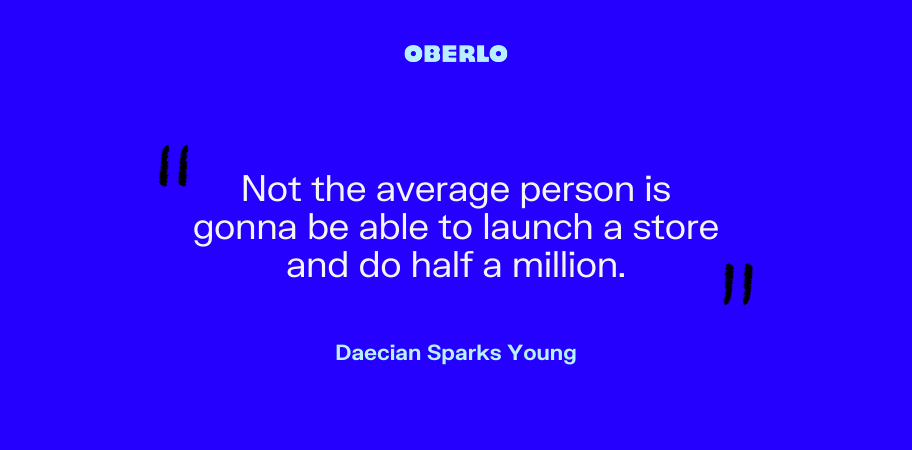
Aleisha: Let's just break down one of your most recent stores and looking at profit and your margins and what you end up putting back into your pocket, versus, you know, these big numbers that are being put out there.
Discovering Outsourcing
Daecian: Yeah, so a lot of the money goes into marketing, obviously, and order fulfillment. So they're the two main things that we spend a lot of money on. In the last year, in the last financial year, I spent over six figures on marketing. And so it's basically what's driving traffic to the website, it's where the majority of the money gets reinvested to and order fulfillment is huge.
And then we also have customer service teams, which are like VAs and you can pay anywhere from $3 to $5 an hour, and hire someone in the Philippines and outsource that.
So like I said, I'm huge on outsourcing, and it really comes down to opportunity cost, how much do you value your time an hour. So let's say I value my time, I don't know, let's say $10 an hour, then it's worth it for me to go and hire someone at $3 an hour and do all the work for me that would take me around, let's say three hours to answer all these emails. So I'm huge on opportunity cost and yeah, so that's where a lot of the money goes to.
Aleisha: And then when... Okay, that's great. And I love the outsourcing. We've done a couple of episodes sort of talking about the benefits of being able to outsource various tasks. So customer service for you is something that you would immediately outsource?
Daecian: Yeah, not immediately, like when I had my first store I was so new to the industry, I had no idea what I was doing. I remember going in and reading emails and replying to emails myself. I was getting like 20 a day and I was like, "Oh yeah, this is pretty cool," replying to emails is fun. I was making sure everyone's happy and everything like loving their products.
And then I was starting to get hundreds a day and I'm like, "Okay, I'm probably... Like I'm making $1,000 a day, I should probably outsource these to someone else now."
And it's so funny because I remember when I had to hire my first VA, I watched a YouTube video on how to hire an employee on UpWork and it's so funny to think like, you have all these learning material out there that you can just literally go and start a business and learn how to hire someone.
But yeah, so that's when I started... I hired a VA when I was getting a lot of emails a day and it was the same with order fulfillment, like I didn't know about Oberlo, I had no idea what it was and I don't know if that was more of an ego thing, I didn't wanna learn and...
But when I first had my store, I was going into AliExpress and literally looking on Shopify, and then typing their address in and typing all their details on AliExpress and ordering it for them with my card. And I just think that's so funny.
And that's why I'm huge on outsourcing now 'cause when I found out about Oberlo and the outsourcing agency and things like that, I was like, "Wait, what? You don't have to type in like 100 orders a day to..." I literally hired a VA to go and do it for me because I had no idea about doing bulk orders and things like that. So yeah.
Aleisha: So you saved yourself a lot of time and cash, I'm assuming, with not having to generate all that.
Daecian: So much. Not even, like you can literally hire a VA for like $3 or $5 an hour, so I was losing a lot of money not focusing on the business and the operational side of the business.
Plans for the Future
Aleisha: Just doing admin. I like that. What are your plans now for the future? Obviously, you've got your store, that's the seasonal store. You just said you launched another store last night, how many stores have you got going and how many are manageable for you?
Daecian: Right now, I got two. I started to die off a little bit, and I've been watching a lot of ecommerce podcasts lately to do with Scott Hilse. Obviously, a majority of people will be familiar with him, he has a collaboration with Oberlo as well. And it just made me... I came to the realization of like, "This is what I love to do."
And I've been in proper hustle mode in the past week. I'm just like, I was celebrating a lot, I would go out and do a lot of... I don't know, I would go out and eat a lot and, yeah, that's fun. But it was like, "Why am I celebrating if I don't have a mil?" That's the mindset that I love to be in.
And so, I have two stores at the moment, I launched another one last night. They're not doing anything crazy. They're not doing any crazy numbers but we just turned off one literally a couple of weeks ago that did $213,000.
But yeah, so that's what I'm focused on right now, it's just hustling, just getting into the zone and doing a lot of ecommerce stores, like I was saying to you earlier, I was watching a lot of podcasts where there are like 15-year-olds literally making millions and it just really motivates me.
And this is what I love to do, I love to build ecommerce stores and scale them to the moon, I'm such an aggressive scaler when it comes to Facebook ads and things like that, and I just honestly love it.
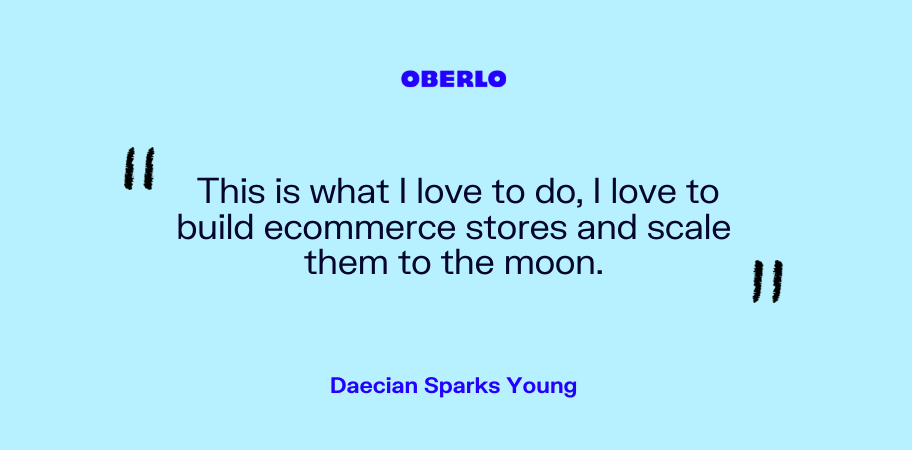
Aleisha: Are you always looking for the next product, are you always sort of sniffing it out?
Daecian: I am now, 100 percent. I'm constantly on AliExpress lately. It's all I've been really focusing my time on. That, and a lot of things to do with my course as well. But yeah, I'm just... Right now, I'm ready to launch, probably I'll launch a few more stores this week just because I'm in a hustle mode.
Aleisha: And you were... Just interesting to share this with the listeners. Is it a one-product store that you follow, or do you... Yeah, that's your game?
Daecian: Yeah, so I always do one-product stores, I always make sure that it really looks like a brand.
I'm a massive believer in fewer clicks equals more sales.
So if a customizer is trusting me enough to go onto my website, out of their way, then I know that they're interested in that product. So why would I send them somewhere else?
It just doesn't make sense in my opinion, if there is another product in the store. Why would I distract them from the original reason that they're coming on to the store for? So, I'm huge on one product branded stores, yeah.
Creating Niche Instagram Accounts and Branding
Aleisha: Just one question I had for you before we go. You mentioned building social proof and making it really look like this is an established brand, especially on social media.
Do you have any tips for our listeners about how they can go about creating niche Instagram accounts or making that look great?
Daecian: 100 percent. Model what's already working. Look at your competitor, look at the biggest company in that area, in that niche, or industry, whatever you're in. Let's say you're doing IPL laser machines, model what's working.
So you've got like Happy Skin Co., they're huge right now. Model what's already working. Look at how their social media looks and model it, don't copy it. Model what's already worked.
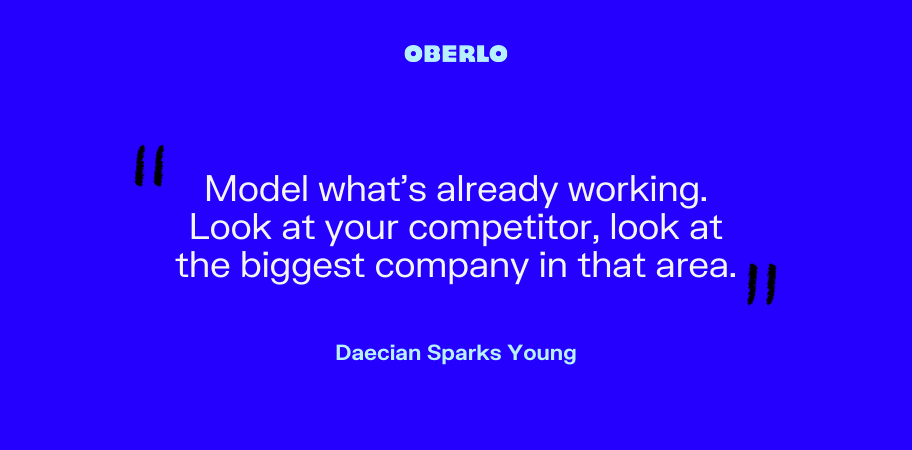
Aleisha: Yeah, I'm glad you said don't copy, 'cause I think there's a lot of bad ju-ju in the industry as well of people ripping other people's stuff, but like anything, adding... Using it for inspiration and seeing what works and what doesn't.
Daecian: Yeah, even like colors, like fonts. What fonts are they using on their website, what colors are they using, where's... What kind of feel do their photos give you?
Aleisha: Yeah, yeah, it's great. Really, really do your research. And I suppose that's it, it's just taking the time to get to know the niche that you're in and the brand that you wanna build. And as you said, consistency and working to maintain a brand, you build a brand rather than do some sort of flash in the pan, if that's what you wanna do.
Daecian: 100 percent. There are a lot of brands out there that are actually dropshipping but no one knows. And that's why, it's so funny, you hear a lot of people talking, kind of down-talking dropshipping. And I feel like TikTok had a lot to do with that because this year, dropshipping has blown up, I've never seen it so big.
And I really think that that comes from TikTok because I see a lot of people on there flexing their numbers and things like that, and you will see all the negative comments in their videos, comments saying, "Oh, what are your margins," and everything. So I really think TikTok made dropshipping.
But at the end of the day, it's really just a business model and you can make a lot of money from it and half of these brands are dropshipping.
Aleisha: Yeah, I've become really good at... Like I'm sure everyone sort of listening is slightly into the industry or at least sort of researching, you get a good eye when you're scrolling through Instagram or Facebook and you figure out, "Oh, yeah, I'm seeing a pattern in things."
But also, I'm really glad that you mentioned building a brand because to me, I still click and I still buy, I support dropshippers, I have no problem with buying from dropshippers. But it's all about trust and integrity for me as a buyer, and if something looks like a brand and looks like it's established, and I wanna give them my money because I know I'm gonna get the product in return and not be shafted. That's a good thing.
Daecian: Exactly. Like if you went onto any of my stores right now, you would immediately think that it's a brand.
Aleisha: Yeah.
Daecian: Even with the social media that I have and everything like that, yeah, it would look like an existing brand that's been in business for ten years.
Aleisha: That's great.
Daecian: So that's what I really want to share with everyone listening right now is build off that.
Aleisha: Fantastic. If people wanna get in touch, you said they can DM you, I know you're big on the Instagram. “You're big on the Instagram” is like, I'm saying, "I'm big in Japan."
Daecian: I got like 2,000 followers, I'm not big at all.
Aleisha: But you're enthusiastic about Instagram. That's where people can get in touch. Give yourself a plug and yeah, let us know where we can connect with you.
Daecian: Yes, so I'm on Instagram, go follow me right now honestly. It’s D-A-E-C-I-A-N, @Daecian, just on Insta and, yeah, if you need any help, just be sure to DM me, and yeah, that's it.
Aleisha: Thank you, thank you so much, Daecian. It's been great, and I'm really looking forward to staying in touch and hopefully doing a catch-up episode with you in the future and seeing what you're doing in the next season.
Daecian: Yeah, I'd love to, I really appreciate the time that you've taken out of your day to get me on this podcast and... Yeah.
Aleisha: You were great.
Daecian: Thank you.
Aleisha: I love it, thank you.
Want to Learn More?
- 16 Dropshipping Tips for New Entrepreneurs You Need To Know
- One Couple’s Secret To Success (and It’s Nothing To Do With Products)
- Coronavirus and Ecommerce: How This Beginner Dropshipper Is Succeeding Despite the Circumstances
- Tales From a Beginner Dropshipper: The Highs and Lows of a Newbie Starting a Store